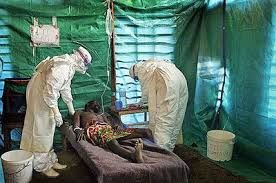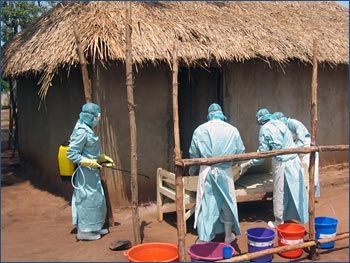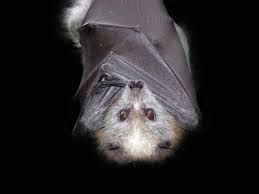
Dennis Lynch of the International Business Times reports Ebola Outbreak: Doctors Without Borders Has 'Reached The Limit Of What It Can Do' In West Africa. Doctors Without Borders (known locally as MSF for Médecins Sans Frontières), director of operations, Dr. Bart Janssens said “The epidemic is out of control,” and vastly more resources are needed to deal with the outbreak of the Ebola virus in Western Africa. “We have reached our limits. Despite the human resources and equipment deployed by MSF in the three affected countries, we are no longer able to send teams to the new outbreak sites.”
The outbreak, which began in February, is the largest and most deadly ever in terms of numbers of dead and cases of infection. Between Guinea, Liberia and Sierra Leone, 567 cases and 350 dead have been reported, according to the World Health Organization (WHO). Guinea, where the outbreak was first reported, has been hit the hardest with 258 confirmed cases and 267 deaths. The first recorded outbreak of Ebola occurred in 1976 and killed 280, no outbreak until now has surpassed that count.

MSF has identified cases in 60 locations in Guinea, Sierra Leone and Liberia. The organization has 300 staff members working in the three countries, but says it is the only organization treating patients with Ebola.
Janssens calls on WHO and neighboring countries to contribute resources to fight the outbreak. Currently the organization says it is providing “technical expertise” to regional governments and supporting their efforts to combat the outbreak. The United Nations Children’s Fund (UNICEF) has sent medical supplies to the region.
No vaccination or cure exists for the Ebola virus which has a mortality rate between 70% to 90% and is spread by human contact with body fluids such as sweat, vomit, and diarrhea, infected medical equipment or clothing, as well as eating infected game meat and bats, or fruit infected by the fruit bat thought to be the long-term reservoir for the virus.

Symptoms include raging fever, vomiting, diarrhea, muscle pain, internal and external bleeding, and death which occur 2 to 21 days after infection.
Doctors Without Borders has come out as the more credible in terms of its earlier friction between the World Health Organization and Doctors which it accused the WHO of downplaying the severity of the outbreak in March, April, and June, when the WHO said not only that the outbreak was under control, but dying out. Also originally MSF called it an "epidemic" and the WHO insisted on calling it an "outbreak."
As readers know from our reports here, MSF asserted, from the first month, that this outbreak, which is no acknowledged as the worst we know of, was unprecedented because of its outbreak pattern with multiple locations. In the past there has been one center of outbreak and all patients can be traced back to contacts with that one patient.
The new pattern may indicate more than one case of animal to human transmission, perhaps even ongoing, which could indicated a large prevalence in the reservoir animal though to be fruit bats which have now been banned, as has been eating game meat such gas primates, gazelles, and antelopes, major sources of food for Western African people.

Doctors Without Borders deserves much credit and appreciation for their "hands on" work, on site, helping the afflicted. Many organizations send supplies or money, but very few, if any organizations, other than the World Health Organization can send trained medical professionals - doctors, and nurses to work right in the middle of the outbreak helping patients and trying to contain it. We have reached Doctor's Without Border's limits.
Who will step forward to fill the gap?
My son's girlfriend's sister has been their working with them, after working previously in Syria, and has just returned home, much to our relief.
2:29 PM PT: Donate to Doctors Without Borders, aka Médecins Sans Frontières
2:36 PM PT: Paul Schemm of the Associated Press report WHO changes reporting method for Ebola deaths reduces death toll in Sierra Leone
RABAT, Morocco (AP) — The World Health Organization on Wednesday announced it was changing the way it reports fatalities from the Ebola outbreak in Sierra Leone at the request of the government.
Previously, probable and suspected deaths from Ebola were included in the count but from now on, only laboratory confirmed cases will be reported, reducing the death toll in Sierra Leone from 58 to 34 as of Tuesday.
"They haven't asked to change their methodology, the only country that decided to change their methodology was Sierra Leone for now," said Chaib.
Sierra Leone's press had criticized the government for reporting lower death rates than the WHO had initially been reporting.
International organizations have dubbed this the worst Ebola epidemic ever with 599 cases and 338 fatalities in dozens of different sites across the three countries, not only in remote areas, but near major cities.
2:48 PM PT: Center for Infectious Disease Research and Policy reports WHO reports 32 more Ebola cases in West Africa
The count of Ebola virus disease (EVD) cases in West Africa has increased by 32, and 15 new deaths have been recorded, but the number of deaths attributed to confirmed cases has been revised downward, according to a World Health Organization (WHO) update today.
The WHO put the totals for Guinea, Sierra Leone, and Liberia at 599 cases and 338 deaths, as compared with 567 cases and 359 deaths reported in the previous update on Jun 22. The case totals include confirmed, probable, and suspected cases.


